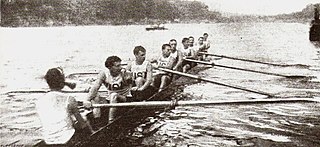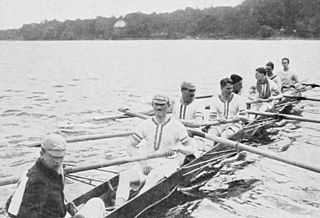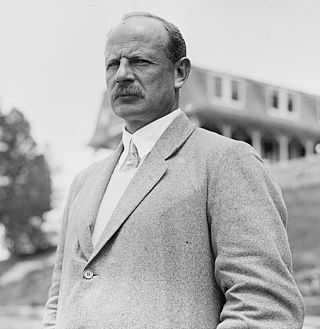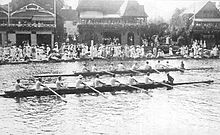
Henley Royal Regatta is a rowing event held annually on the River Thames by the town of Henley-on-Thames, England. It was established on 26 March 1839. It differs from the three other regattas rowed over approximately the same course, Henley Women's Regatta, Henley Masters Regatta, and Henley Town and Visitors' Regatta, each of which is an entirely separate event.

The Thames Rowing Club (TRC) is a rowing club based on the tidal Thames as it flows through the western suburbs of London. The TRC clubhouse stands on Putney Embankment. The club was founded in 1860.

London Rowing Club is the second oldest of the non-academic active rowing clubs on the Thames in London, United Kingdom. It was founded in 1856 by members of the long-disbanded Argonauts Club wishing to compete at Henley Royal Regatta.

The men's eight was one of the competitions in the Rowing at the 1900 Summer Olympics events in Paris. It was held on 25 and 26 August 1900. 5 boats, involving 46 rowers from 5 nations, competed. The event was won by the United States, represented by the Vesper Boat Club. Silver went to the Royal Club Nautique de Gand of Belgium, with bronze to Minerva Amsterdam from the Netherlands.

The men's single sculls was one of four rowing events on the Rowing at the 1908 Summer Olympics programme. Nations could enter up to 2 boats. Nine rowers from six nations competed. The host nation, Great Britain, earned the top two spots with Harry Blackstaffe taking gold and Alexander McCulloch silver. It was the first victory in the event for Great Britain, which had taken bronze in 1900. The two bronze medals went to semifinalists Bernhard von Gaza of Germany and Károly Levitzky of Hungary, both nations making their debut in the event.

The men's coxed four was a rowing event held as part of the Rowing at the 1912 Summer Olympics programme. It was the second appearance of the event, which had been held at the 1900 Summer Olympics but had been replaced by coxless four at the 1904 and 1908 Games. The standard coxed four event allowed for outriggers, while another event was held in 1912 for boats with inriggers. The competition was held from 17 to 19 July 1912.

The men's coxed fours with inriggers, also referred to as the coxed four with jugriggers, was a rowing event held as part of the Rowing at the 1912 Summer Olympics programme. It was the only appearance of the restricted event. The competition was held on Wednesday and Thursday, 17 and 18 July 1912. Thirty rowers from four nations competed.

The men's eight was a rowing event held as part of the Rowing at the 1912 Summer Olympics programme. It was the fourth appearance of the event. The competition was held from Wednesday to Friday, 17 to 19 July 1912. Ninety-nine rowers from eight nations competed. Nations were still permitted to have two boats each in the event.
Henry Creswell Bucknall was a British rower who competed in the 1908 Summer Olympics.

Banner Carruthers Johnstone was a British oarsman who competed in the 1908 Summer Olympics.

Guy Nickalls was a British rower who competed in the 1908 Summer Olympics as a member of the British eight that won gold, won 22 events at Henley Royal Regatta and won the Wingfield Sculls three times.

The men's eight event was part of the rowing programme at the 1920 Summer Olympics. The competition was held on 28 and 29 August 1920. It was the fifth appearance of the event. Eight boats, each from a different nation, competed. It was the first time that nations were limited to a single boat. The event was won by the United States in a final against Great Britain; the two nations had taken all four previous gold medals. Bronze went to Norway, the nation's first medal in the men's eight. In addition to gold medals, the winners received a challenge prize that had been donated by Eugenio Brunetta d'Usseaux before his death in 1919.

Koninklijke Roeivereniging Club Gent is a rowing club from the Belgian city of Ghent founded in 1871. The association is located at the Ghent urban Watersportbaan rowing course.
The Ghent Student Regatta was a boat race for students in April 2008 at Portus Ganda in the heart of historical Ghent in Dutch-speaking Flanders, Belgium. It was an initiative of Paul Van Cauwenberge, the Rector of Ghent University, in collaboration with Ghent Students Rowing, the sports department of the City and Patrick Rombaut, Umpiring Commission Chairman of the Fédération Internationale des Sociétés d'Aviron (FISA).

New College Boat Club (NCBC) is the rowing club for members of New College, Oxford. The club's existence can be dated to 1840 when it first raced on The Isis in Oxford.
The East-Flemish Rowing League (EFRL) is a member of the Flemish Rowing League, the first federalised sports league of Belgium. It is a member of the Belgian Royal Rowing Federation, which in turn is also a founding member of the Fédération Internationale des Sociétés d'Aviron (FISA), the oldest Olympic international sports federation.

The men's eight event was part of the rowing programme at the 1924 Summer Olympics. The competition, the sixth appearance of the event, was held from 13 to 17 July 1924 on the river Seine. Ten teams, each from a different nation, competed. The event was won by the United States, the nation's second consecutive and fourth overall victory in the event. Canada took silver, its first medal in the men's eight since 1908. Italy, making its debut in the event, took bronze.
The 66th Boat Race took place on 3 April 1909. Held annually, the Boat Race is a side-by-side rowing race between crews from the Universities of Oxford and Cambridge along the River Thames. Cambridge were reigning champions, having won the previous year's race, while Oxford's heavier crew contained three Olympic gold medallists. In a race umpired by Frederick I. Pitman, Oxford won by 3+1⁄2 lengths in a time of 19 minutes 50 seconds. It was their first win in four races and took the overall record to 35–30 in their favour.

The 70th Boat Race took place on 13 March 1913. Held annually, the Boat Race is a side-by-side rowing race between crews from the Universities of Oxford and Cambridge along the River Thames. Oxford went into the race as reigning champions, having won the previous year's race. The two crews contained a total of five medallists from the 1912 Summer Olympics. Umpired by former Cambridge rower Frederick I. Pitman, Oxford won this year's race by three-quarters of a length in a time of 20 minutes 53 seconds. The victory took the overall record in the event to 39–30 in their favour.

Thomas Ford is a British national representative rower. He is an Olympic and two-time world champion in the men's eight event.

















